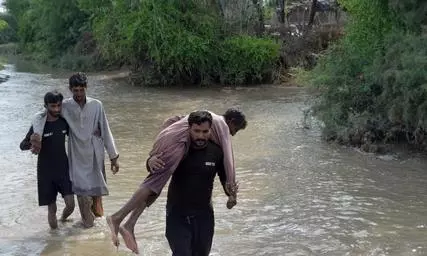
Monsoon rains and flash floods kill 116 in Pakistan
text_fieldsIslamabad: Torrential monsoon rains and flash floods have claimed at least 116 lives and injured 253 others across Pakistan since June 26, according to the National Disaster Management Authority (NDMA). In the past 24 hours alone, five more deaths and 41 injuries were reported due to rain-related incidents.
According to NDMA the Eastern Punjab province recorded the highest death toll with 44 fatalities, followed by Northwestern Khyber Pakhtunkhwa with 37, Southersn Sindh with 18, and Southwestern Balochistan with 16. One person died in Pakistan-administered Kashmir, while Gilgit-Baltistan and the Islamabad Capital Territory reported no casualties, Xinhua news agency reported.
Heavy rains are forecast to continue through Thursday, prompting the NDMA to issue flash flood alerts for parts of Punjab, Khyber Pakhtunkhwa, and Balochistan. The Provincial Disaster Management Authority (PDMA) had earlier warned Khyber Pakhtunkhwa districts of likely flooding between July 11 and 17 due to a fresh spell of monsoon rains.
The monsoon season in Pakistan, which lasts from June to September, often leads to severe disruption, with deadly floods, landslides, and mass displacement, especially in densely populated and poorly drained areas.
In Sindh, rain accompanied by windstorms and thunderstorms is expected in several districts from July 14 to 16. The Pakistan Meteorological Department (PMD) has also warned of possible urban flooding in low-lying areas of major cities, including Islamabad, Rawalpindi, Lahore, Faisalabad, Multan, and Peshawar.
Between June 26 and July 14, electrocution emerged as the leading cause of rain-related deaths, followed by flash floods. In a particularly tragic incident, 13 tourists were swept away and killed in late June while sheltering on a riverbank during sudden flooding.
Authorities have urged residents in vulnerable areas to take precautions as rescue and relief operations continue across affected regions.
However, the situation has been worsened by long-standing failures in urban infrastructure maintenance, particularly in Sindh. Despite early warnings and weather alerts, the provincial government has reportedly taken little action to clean storm water drains and sewers. Many areas remain waterlogged, with new rainfall expected to worsen the conditions from July 15 onwards.
In Hyderabad, locals have raised concerns over broken or missing walls along clogged drains filled with garbage. The Express Tribune reported that no repair work has been carried out, despite formal warnings from the Meteorological Department and meetings held by government officials.
On July 10, the Sindh Local Government Department issued directives to municipal bodies to take preventive measures. Yet, over 48 hours later, residents say no meaningful action has been taken.
Despite receiving Rs 1.2 million in monthly government grants, local Union Committees have failed to allocate funds for critical services like drain cleaning. Much of the budget is reportedly consumed by salaries and utility payments.
Each year, the Sindh government holds emergency meetings and announces monsoon preparedness plans, allocating millions of rupees. However, drains often remain uncleared, and reports allege that fake bills are submitted for work that is never carried out, highlighting widespread misuse of public funds.
So far, no official or department has been held accountable for repeated lapses, according to local media reports.


















